In this article, you’ll learn:
Google Drive is a bit like a Swiss Army knife. It’s handy because it does a little of everything, but it doesn’t really shine at any one thing. For many people it’s a perfectly fine starting point — and then, sooner or later, the cracks start showing once the library grows and the workflow gets more complicated.
You can also use Google Drive for free until you hit the 15 GB limit.
That’s why we put together a list of 18 Google Drive competitors — tools that aren’t just “good enough,” but might actually fit your needs better. The point of this guide is to help you pick an alternative that matches how your team works, not just another place to dump files.
Our Shortlist of Top 10 Tested Google Drive Alternatives
| Cloud Storage | Best for | Score (0–100) |
|---|---|---|
| Pics.io | Best for creative teams and visual libraries | 83 |
| Microsoft OneDrive | Best for Microsoft Office users | 81 |
| Amazon S3 | Best for tech-centered organizations | 80 |
| IDrive | Best for small businesses with backup and sync needs | 79 |
| NordLocker | Best for security and privacy | 78 |
| Kdan Cloud | Best for Kdan's creative tools users | 77 |
| Dropbox | Best for small teams needing seamless file syncing | 76 |
| Box | Best for regulated industries needing compliance features | 75 |
| Sync.com | Best for privacy-conscious individuals | 74 |
| iCloud | Best for Apple device users and personal storage | 68 |
So, Why Look for an Alternative to Google Drive?
Privacy issues. Google Drive is widely used, but its policies allow automated systems to scan content in certain situations — for example, to improve security and to power features like search and Smart Compose.
Not scalable. Drive comes with hard caps: a Shared Drive can contain up to 400,000 items, and a single user can store up to 5 million items. When a business expands, it’s possible to run into those limits.
Broken links are multiplying. When a file is moved to a different user, an existing shared link might stop working. You may replace an image, but the current URL can still lead to the old version. And file sharing brings its own permission risks — when access isn’t managed carefully, it can turn into a security problem.
Support is on your own. If you hit a technical issue or need help from a product specialist, the usual path is still documentation and community forums. That’s not ideal when something is blocking work and you need a quick answer.
File organization is limited. Drive is mostly folders — and folders are rigid. There are no native tags, keywords, or custom fields to organize files. As projects grow, collaboration tends to slow down, and duplicates or outdated versions become harder to avoid.
Costs go up quickly. You get 15 GB for free, but the price jumps once you need more space. With Google Workspace, the cost depends on how many users you have and is often billed per user per month — which can get expensive for bigger teams.
Preview of files is limited. Drive previews common formats like PDFs, images, and videos. But it’s not great with RAW files, CAD designs, and many other professional formats.
Lack of sophisticated features. Drive is simple by design, but that simplicity also means fewer workflow tools: automation, metadata editing, and other features that help teams work efficiently. Without version control or approval workflows, creative and marketing teams often spend a lot of time managing files instead of doing higher-value work.
Doesn’t meet specific demands. Drive is fine for documents, but teams in media, education, or agencies often need more control: password-protected links, analytics, audit logs, expiring access. Without those, it’s harder to manage who sees what, you can’t track asset performance, and compliance risks go up.
Best Google Drive Alternatives for Creative Teams and Big Visual Libraries
Pics.io
Pics.io is a digital asset management (DAM) platform built for organizing, sharing, and collaborating on media files. Compared to Google Drive, it adds version control, metadata tools, and branded sharing portals.
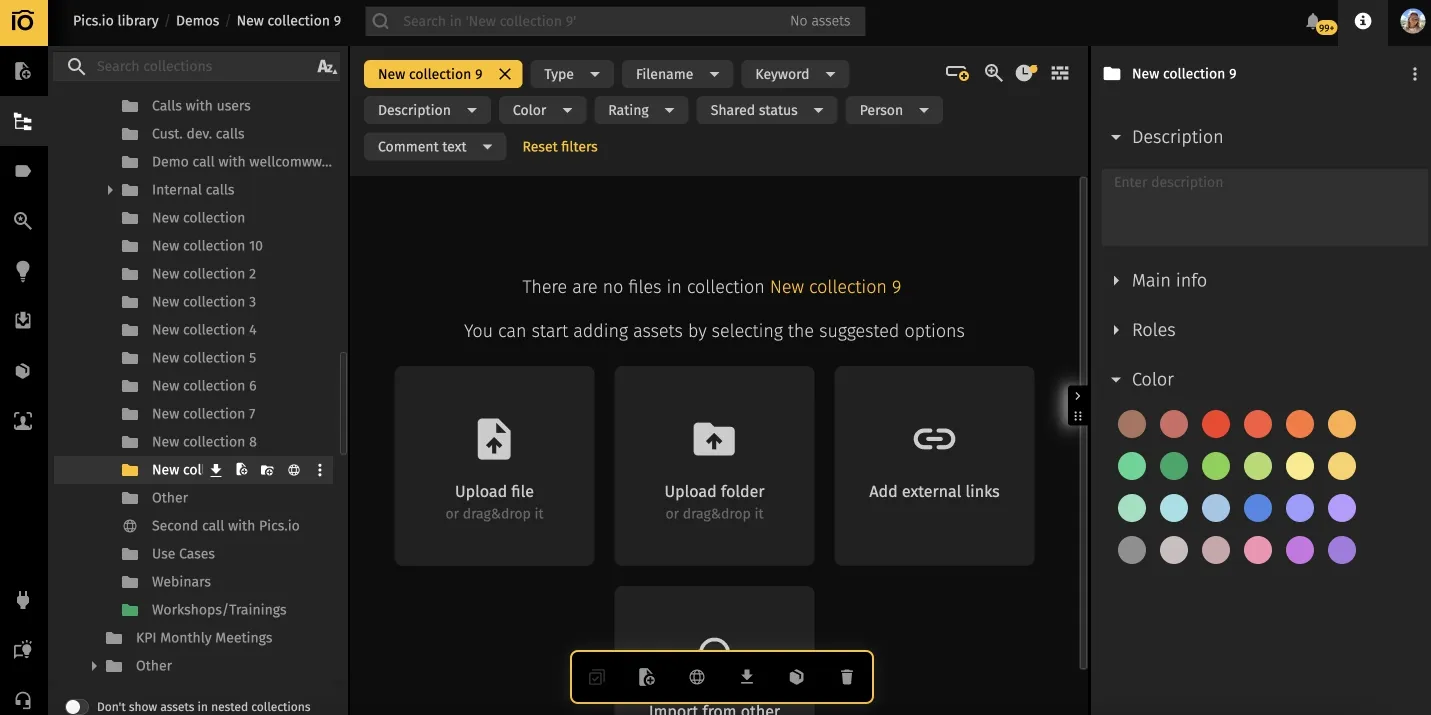
Why it stands out
Pics.io lets teams search using tags, custom metadata, and AI suggestions — the kind of discovery you don’t really get in Google Drive. Versions, approvals, and comments stay connected to the file, so the context doesn’t disappear and people don’t have to guess which version is final. Permissions can be controlled precisely, sharing can scale without the usual limits, and teams can work across multiple portals.
It also supports multiple storage options and offers live human support, which can make managing large visual libraries easier.
What's missing
There’s a learning curve. If your team hasn’t used DAM software before, it may take a bit of time to get used to the interface and the way work is structured. The built-in editor covers basic tasks, but advanced graphic design still belongs in dedicated design tools.
Who it's for
Pics.io is designed for design teams, marketing and communications departments, and organizations handling large volumes of visual content.
Pricing
| Plan | Storage | Monthly | Annual |
|---|---|---|---|
| Solo | 100GB+ or BYOS | $100 | $1,200 |
| Micro | 1TB+ or BYOS | $250 | $2,700 |
| Small | 3TB+ or BYOS | $800 | $8,160 |
| Enterprise | 5TB+ or BYOS | Custom | Custom |
You can test Pics.io's functionality for free for 7 days, without linking a bank card or making long-term commitments.
Hands-on notes
If you used the DAM software before, getting the hang of Pics.io is easy. Generally, uploading, syncing, and restoring are quick and intuitive processes.
Microsoft OneDrive
OneDrive is one of Google Drive’s main competitors. It’s especially convenient for teams on Windows and Microsoft Office, where it can feel like a natural extension of the tools people already use.
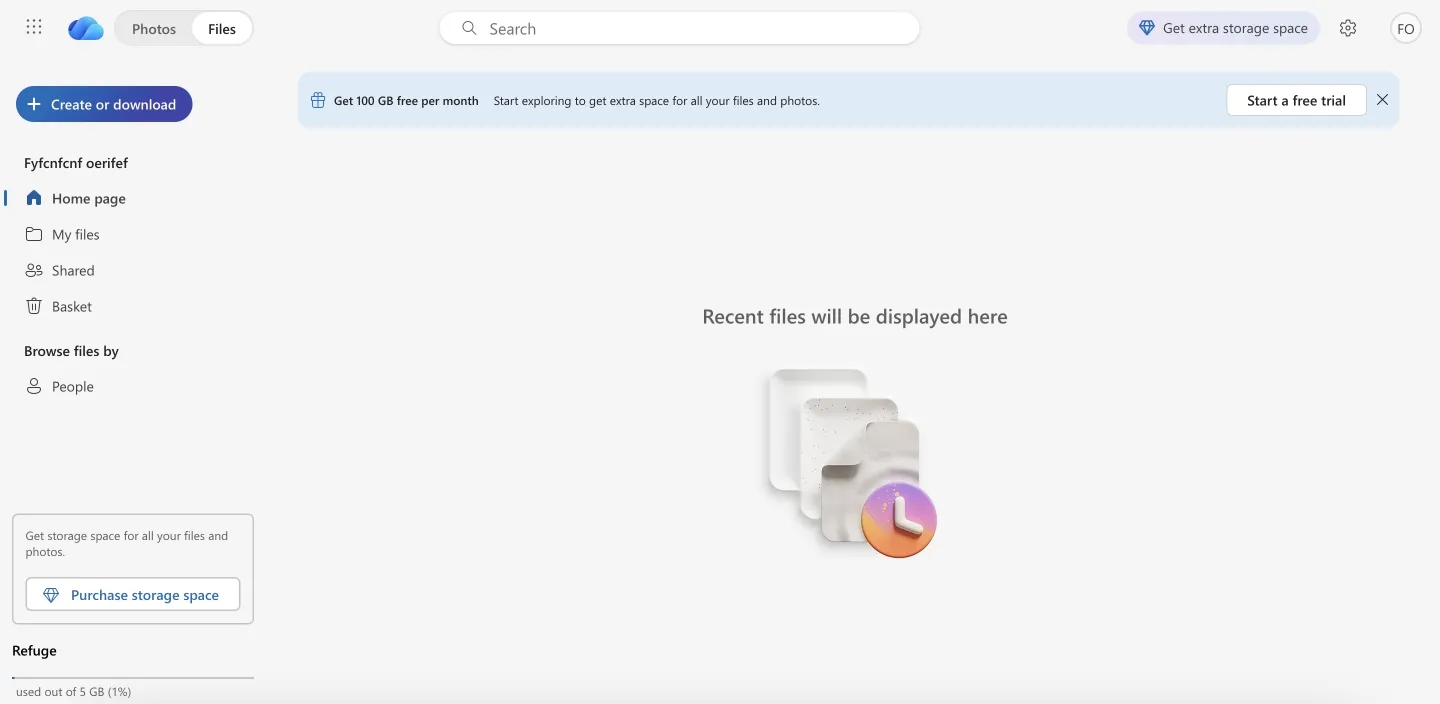
Why it stands out
For Windows users, OneDrive often feels more familiar than Google Drive. Its integration with Microsoft Office makes it easy to collaborate on documents in real time without downloading files or passing attachments around. Security features built into the platform also help organizations feel more confident about protecting sensitive data.
OneDrive also gives admins granular controls: who can view or edit files, plus organization-wide sharing policies. And Office integration supports real-time co-authoring in Microsoft Word, both on the web and on desktop.
What's missing
OneDrive is strongest when your team lives in Microsoft’s ecosystem. If you rely on non-Microsoft apps, integrations may feel more limited than Google Drive. And because OneDrive’s overall approach is similar to Drive, it shares some familiar drawbacks, including limited offline editing and occasional syncing delays.
Who it's for
OneDrive is a strong fit for larger teams that mainly use Windows and Microsoft Office, especially when they need Office collaboration, built-in security, and centralized administration.
Pricing
| Plan | Storage | Monthly | Annual |
|---|---|---|---|
| Microsoft 365 Personal | 1 TB | $9.99 | $99.99 |
| Microsoft 365 Family | 6 TB (1TB/ user month) | $12.99 | $129.99 |
| Microsoft 365 Premium | 6 TB (1TB/ user month) | $19.99 | $199.99 |
Hands-on notes
If your team already runs on Microsoft, OneDrive is often the most practical alternative. If not, another option on the list might feel more comfortable day to day.
Dropbox
Dropbox is one of the best-known alternatives to Google Drive. Its core promise is simple: keep your files synced reliably, and make access control clear.
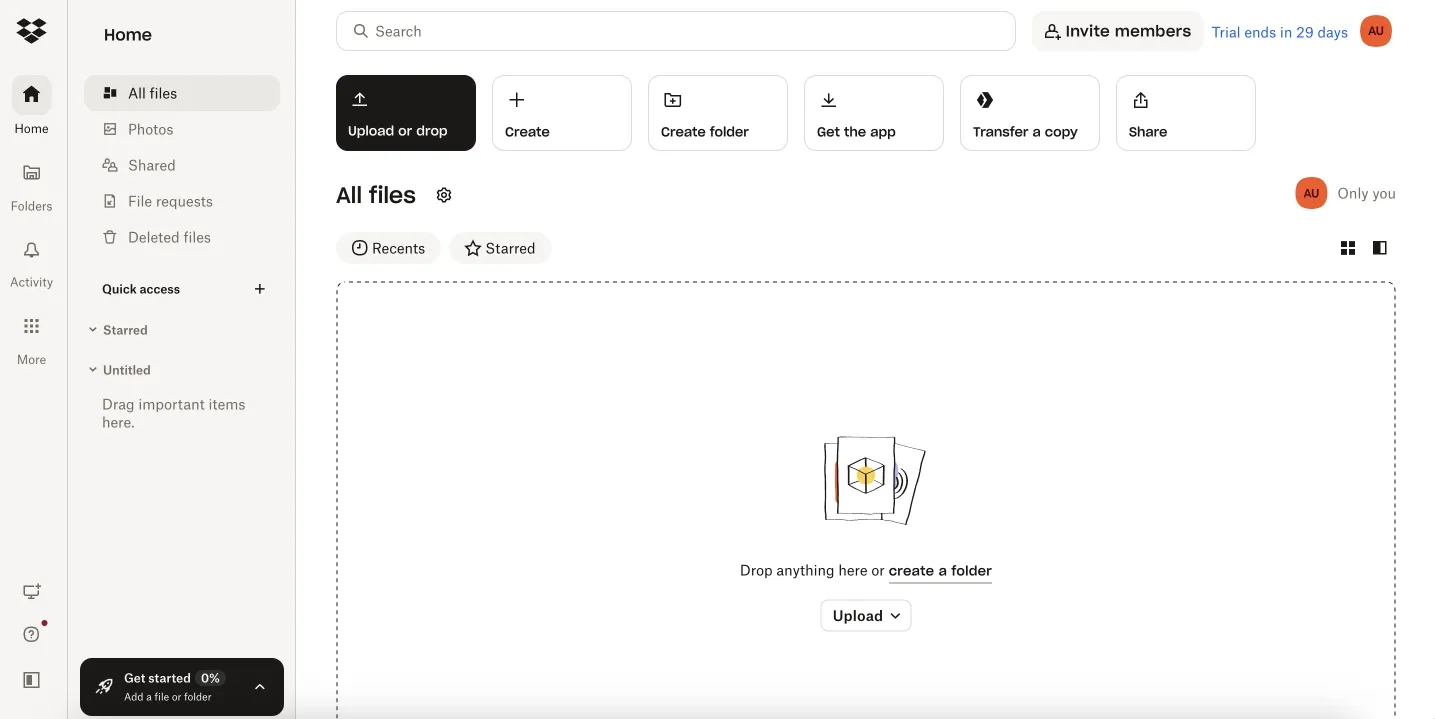
Why it stands out
Where Google Drive leans on convenience inside Google’s ecosystem, Dropbox leans on speed and clean syncing. It’s built for people who don’t want to think about syncing at all. Dropbox uses block-level synchronization — it uploads only the changed parts of a file instead of re-uploading the whole file. With large files (videos, photos, design files), that can be a big time-saver.
What's missing
Dropbox isn’t always cost-efficient for large teams, because storage costs can grow quickly as you scale. And real-time collaboration still depends on external tools like Google Docs or Microsoft Office, so it’s less seamless for live document co-editing than Drive or OneDrive.
Who it's for
Dropbox is a good match for teams, freelancers, and creative professionals who value fast syncing, reliable uploads, and stronger privacy controls.
Pricing
| Plan | Storage | Monthly | Annual |
|---|---|---|---|
| Basic (Free) | 2 GB | – | – |
| Plus | 2 TB | $11.99 | $119.88 |
| Family | 2 TB (shared) | $19.99 | $199.88 |
| Professional | 3 TB | $19.99 | $199.88 |
| Standard (Teams) | 5 TB | $12/ user month | $144/user |
| Advanced (Teams) | As needed | $20/ user month | $240/user |
Hands-on notes
Uploads start quickly, and block-level sync makes updates on big files noticeably faster. The desktop app works smoothly on both macOS and Windows and keeps folders mirrored without constant manual effort.
pCloud
pCloud is a cloud storage service that keeps files accessible across devices and gives you control over sharing and permissions.
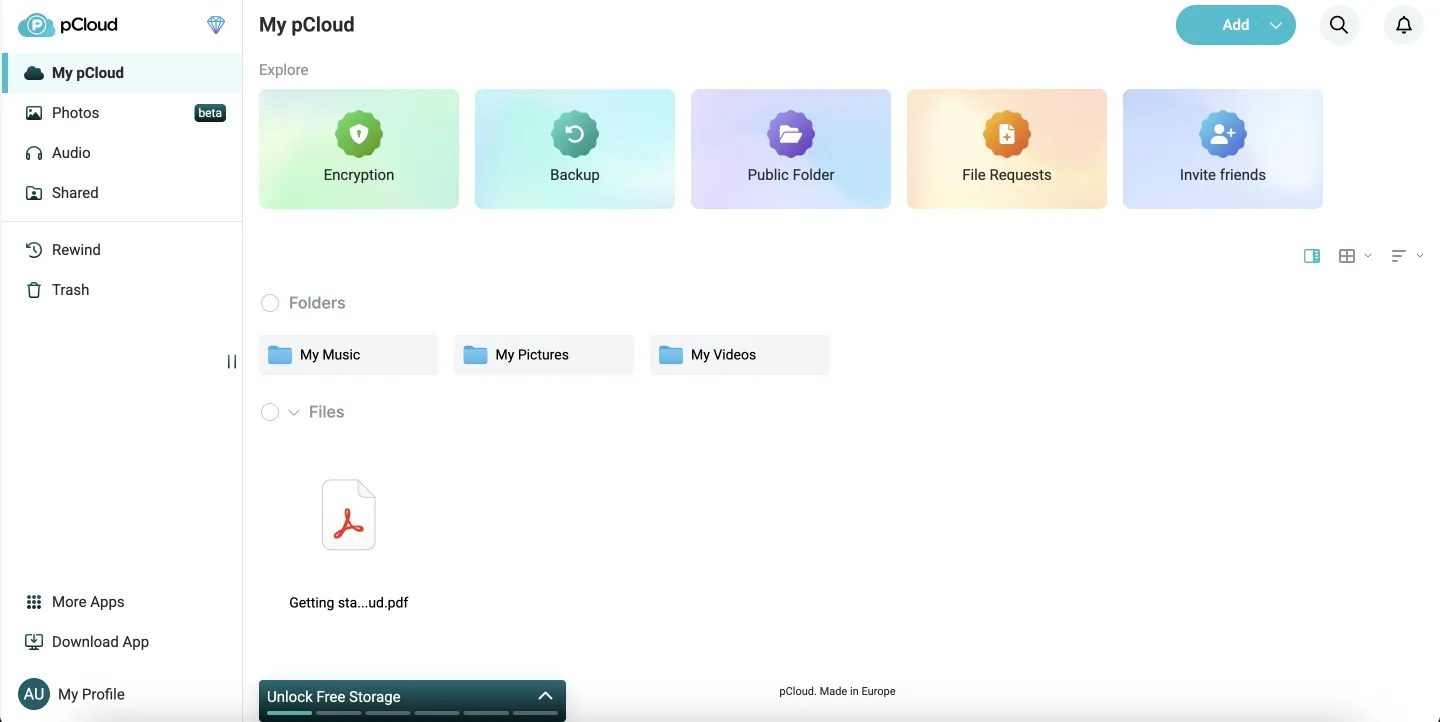
Why it stands out
Unlike Google Drive, pCloud allows password-protected links that people can download without creating an account. That can make collaboration with external partners simpler. It also syncs across devices automatically, so projects stay updated without extra steps.
What's missing
Compared to some other platforms, real-time document editing is limited, so collaboration isn’t as seamless as with tools built around co-editing.
Who it's for
pCloud fits individuals or small groups that want secure cloud storage without a major investment. It’s also one of the more cost-effective options if you mainly need storage for backups.
Pricing
| Plan | Storage | Monthly | Annual | Lifetime |
|---|---|---|---|---|
| Premium | 500 GB | $4.99 | $49.99 | $199 |
| Premium Plus | 2 TB | $9.99 | $99.99 | $399 |
| Ultra 10 TB | 10 TB | $19.99 | $199.99 | $1190 |
Hands-on notes
It’s straightforward to use: uploading and organizing files feels simple, syncing is reliable, and link sharing is easy. Passwords and expiration dates are helpful when you need more control.
Box
Box is often used by teams that collaborate with clients and partners across different storage systems. It also supports automation and integrates with many third-party desktop and mobile apps.
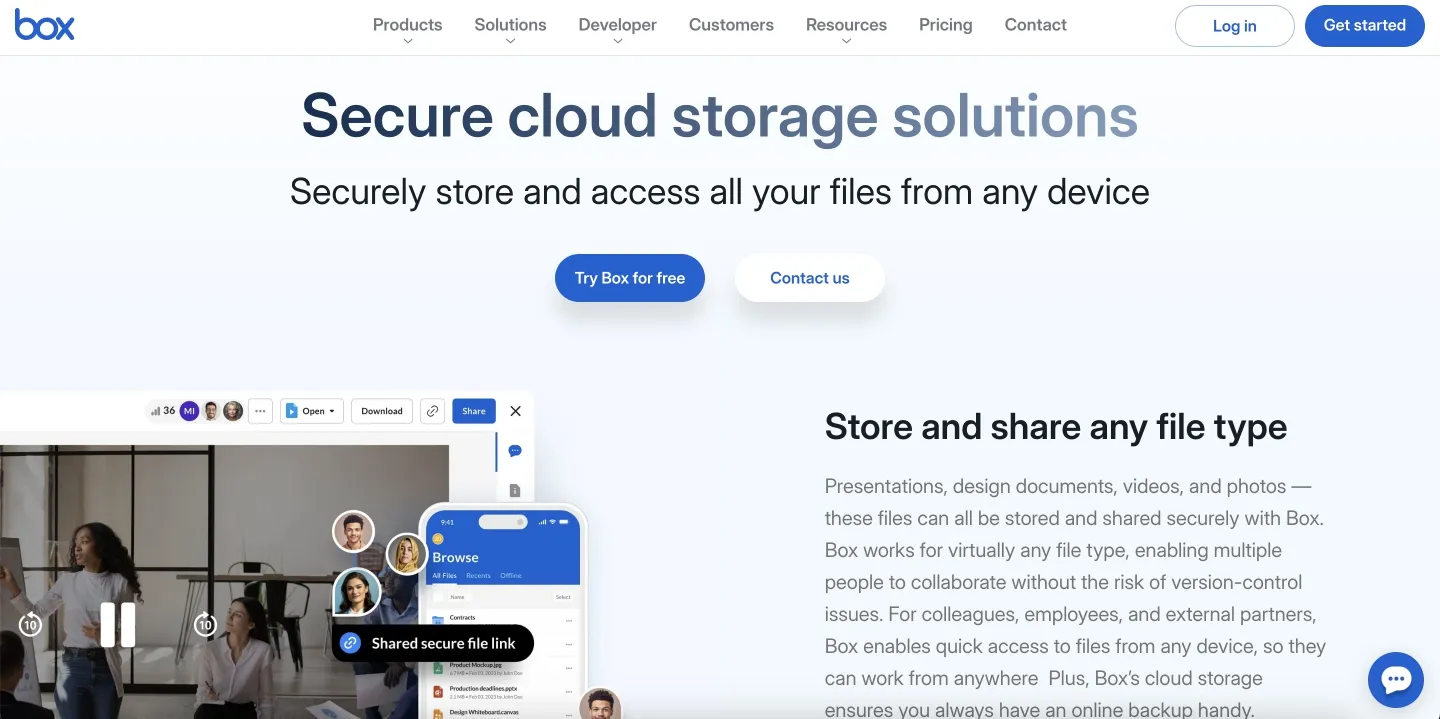
Why it stands out
Box is positioned as more than basic storage. Compared to Google Drive, it offers more granular permission controls, supports custom workflows, and has a large ecosystem of third-party integrations. That helps when you need to share sensitive files securely and also keep track of who accessed what.
What's missing
Box’s free plan is limited compared to Google Drive or Dropbox: 10 GB of storage and a 250 MB upload limit. While Box does offer metadata tagging and advanced search, many of those features — along with other advanced tools and AI features — are typically tied to higher-tier paid plans.
Who it's for
Box is excellent for business users in medium- to large-sized teams who work closely with clients or external partners and need control over who can see what.
Pricing
| Plan | Storage | Monthly | Annual |
|---|---|---|---|
| Individual | 10 GB | – | – |
| Personal Pro | 100 GB | €12 | €108 |
| Business Starter | 100 GB | €6/ user month | €216/ 3 users |
| Business | Unlimited storage | €18 | €648/ 3 users |
Hands-on notes
Using Box feels comfortable at first. Uploading files, creating shared folders, and managing permissions is straightforward. The interface works well on desktop and mobile, though the number of settings can feel like a lot early on.
Sync
Sync focuses on privacy and protects files with zero-knowledge encryption. Your files stay accessible and synced across devices.
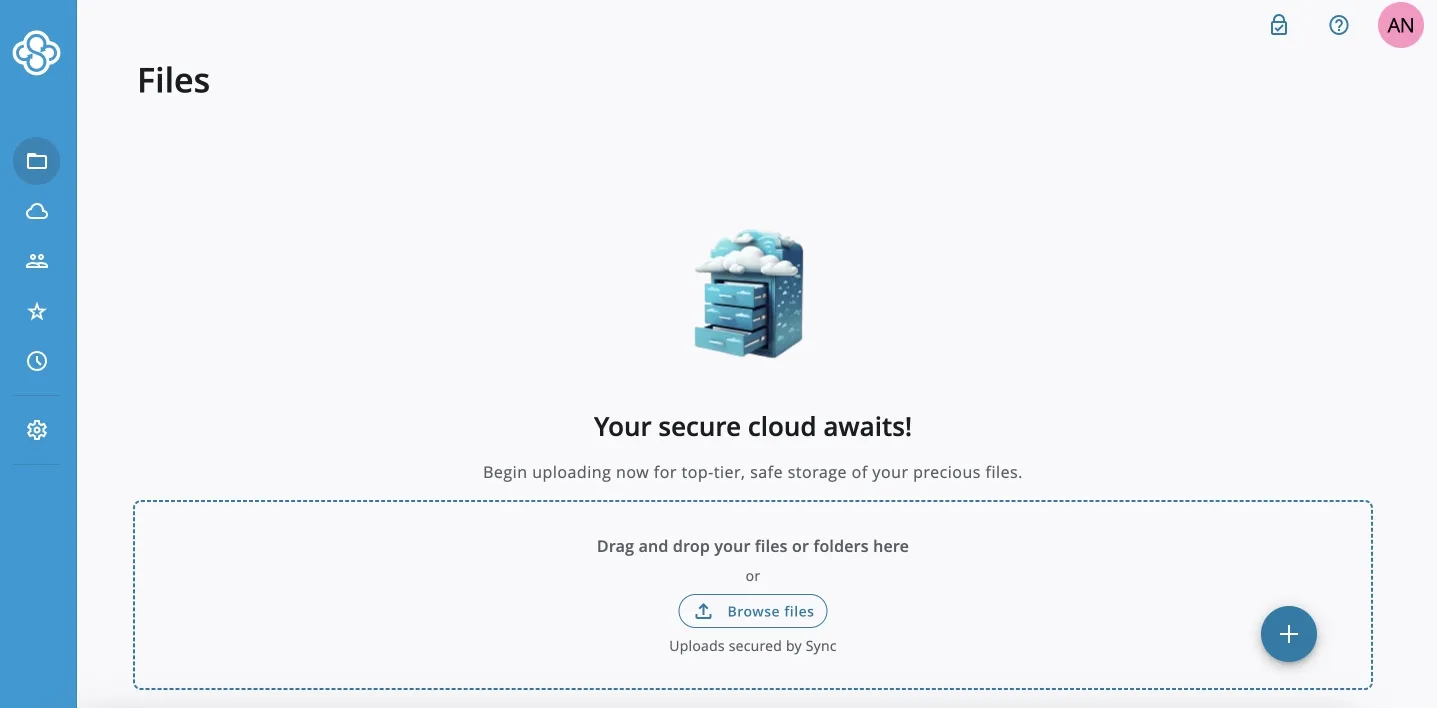
Why it stands out
It's designed as secure storage first, collaboration second. It stores keys on your device, so only you can access your files, and even the provider cannot decrypt or view your files.
What's missing
Sync's file organization and search features are less flexible than those of other competitors. Large libraries can be challenging to navigate, and advanced collaboration tools are limited compared to other cloud storage services. Uploading 1GB+ files is slow due to the encryption process.
Who it's for
Sync is ideal for individuals who value privacy and for teams that require secure cloud storage with minimal sharing. File versioning is accurate and beneficial for firms that handle sensitive documents, legal files, or customer information.
Pricing
| Plan | Storage | Monthly | Annual |
|---|---|---|---|
| Free | 5 GB | — | — |
| Personal | 200 GB | $5 | $60 |
| Solo | 2 TB | $10 | $96 |
| Solo Professional | 6 TB | $24 | $240 |
| Teams Standard | 1 TB | $8/ per user | $72/ per user |
| Teams+ Unlimited | Unlimited | $18/ per user | $180/ per user |
Hands-on notes
Sync.com allows offline file editing. So, you can access and review content even without a stable internet connection.
iCloud
iCloud keeps your files synced across your Apple devices. It's handy if you're all-in on Apple, but less valuable if you switch between Windows and Android.
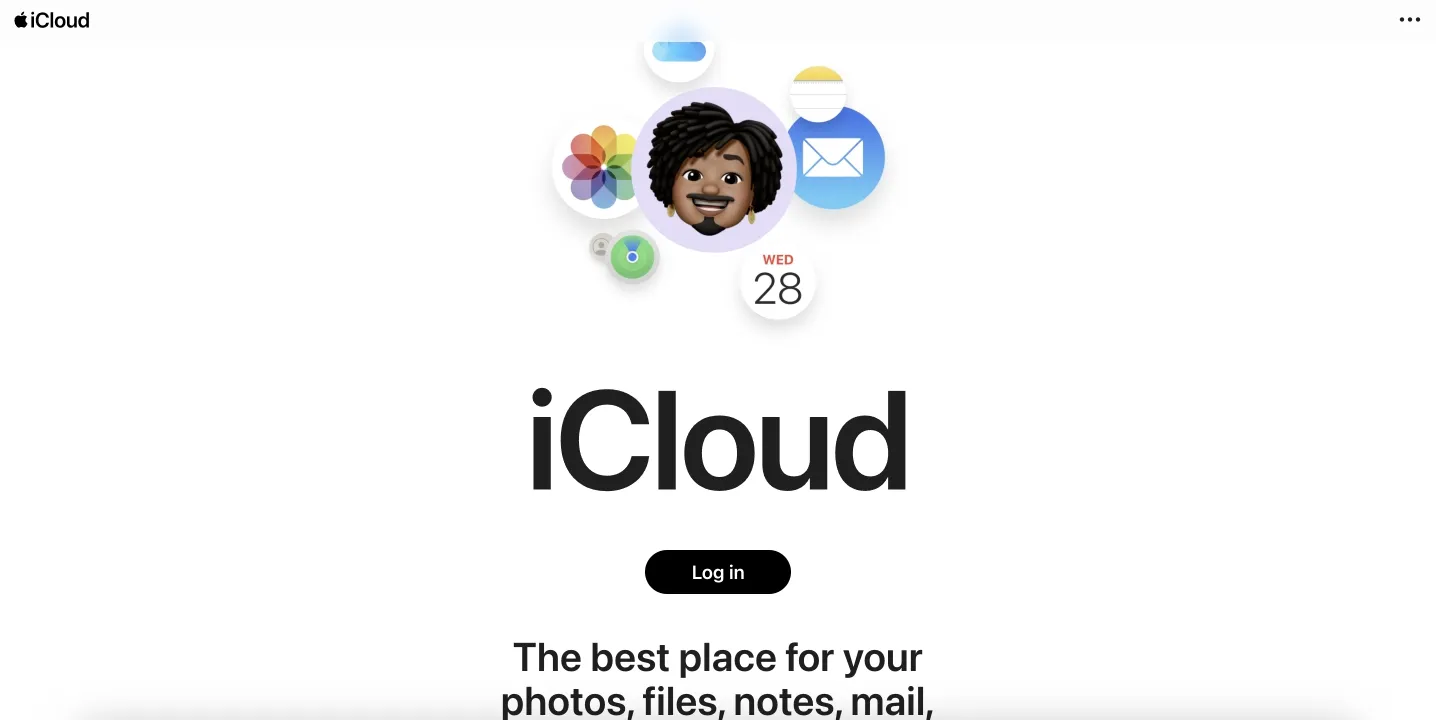
Why it stands out
The best part about iCloud is how smoothly it works across macOS and iOS. Files saved to your Desktop or Documents folder show up on other Apple devices immediately. Shared folders also make it easier to collaborate with other Apple users.
iCloud Drive is also accessible on other platforms, including Windows and the web.
What's missing
iCloud is weaker on team collaboration than Google Drive, which can make it awkward for larger groups. Upload speeds can vary depending on file size and how much is syncing at the same time. File versioning is also limited, which can be an issue for bigger projects.
Who it's for
Individuals and families using the Apple ecosystem who want storage that works quietly in the background without extra tools.
Pricing
| Plan | Storage | Monthly |
|---|---|---|
| Free | 5 GB | – |
| iCloud+ 50 GB | 50 GB | $0.99 |
| iCloud+ 200 GB | 200 GB | $2.99 |
| iCloud+ 2 TB | 2 TB | $9.99 |
| iCloud+ 6 TB | 6 TB | $29.99 |
| iCloud+ 12 TB | 12 TB | $59.99 |
Hands-on notes
If you’re fully inside Apple’s ecosystem, iCloud is convenient and reliable, but it can feel restrictive if you need more serious versioning.
MEGA
MEGA is a secure cloud solution that offers automated file syncing, server backups, a built-in VPN, and even business messaging.
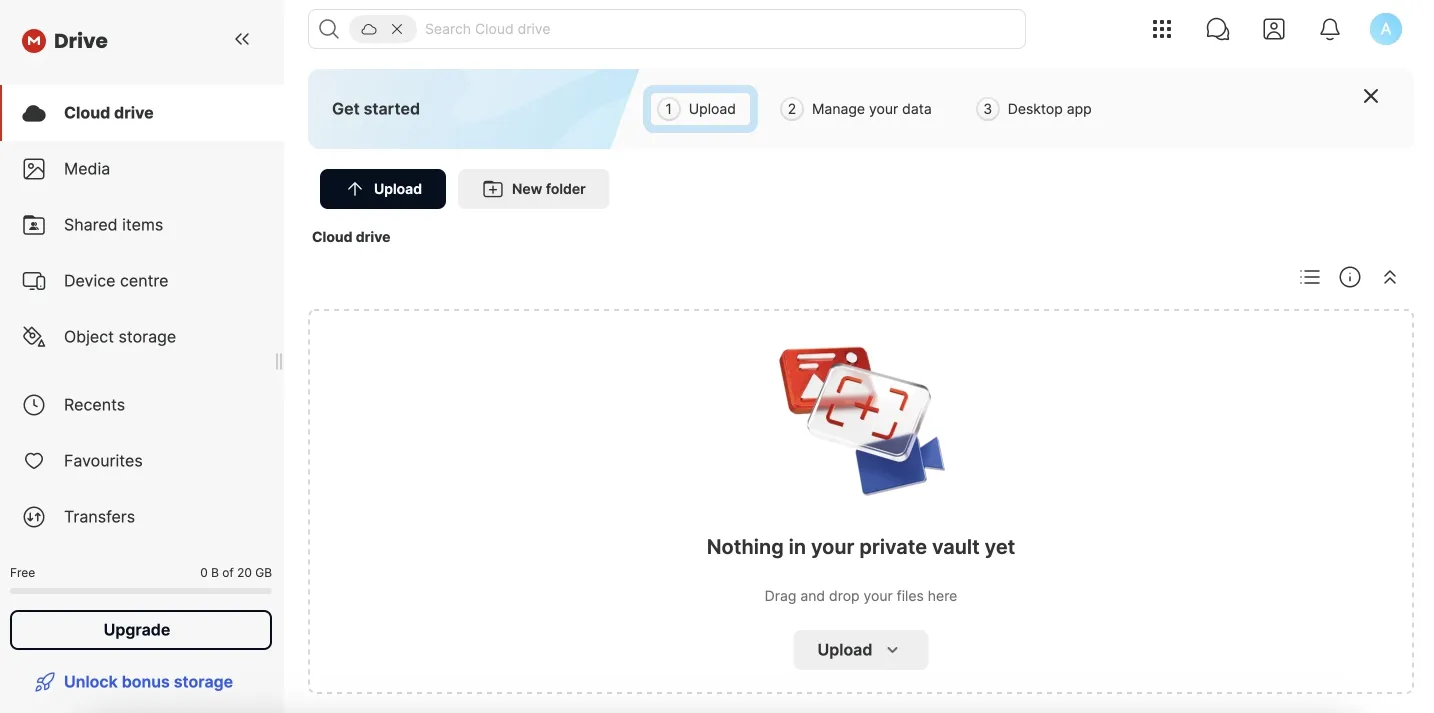
Why it stands out
Files are end-to-end encrypted, so only you and the people you share with can access them.
MEGA also offers 20 GB of free cloud storage, which is more than most competitors. Unlike Google Drive, it prioritizes privacy.
What's missing
Because of its zero-knowledge design, MEGA can’t restore access if you lose your password or recovery key. Free accounts also have transfer quotas that can restrict large uploads or downloads. Those limits are higher on paid plans.
Who it's for
Small teams that work with sensitive data and prioritize privacy over sophisticated collaboration features would love MEGA. It's more like a digital vault than a collaborative workplace area.
Pricing
| Plan | Storage | Monthly | Annual |
|---|---|---|---|
| Free | 20 GB | – | – |
| Pro Lite | 750 GB | €4.99 | €50.04 |
| Pro I | 2 TB | €9.99 | €99.96 |
| Pro II | 8 TB | €19.99 | €200.04 |
| Pro III | 16 TB | €29.99 | €300 |
Hands-on Notes
Uploads and syncing are generally stable. After you hit MEGA’s bandwidth limit, transfer speeds drop. Restoring older versions is fairly quick. Overall, it’s built for people who care most about privacy, not convenience-sharing.
NordLocker
NordLocker is a personal cloud storage solution with a strong emphasis on security. It offers encrypted file storage and syncing across devices.
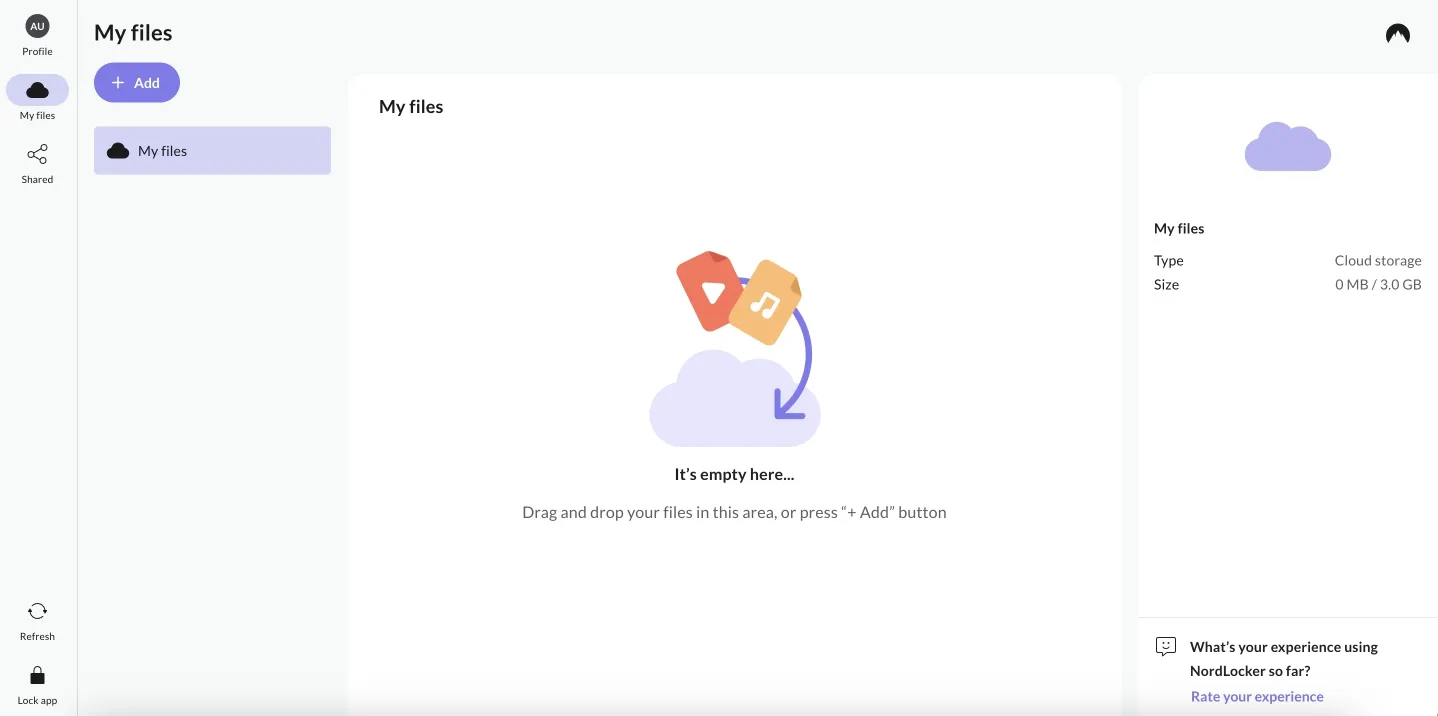
Why it stands out
NordLocker’s big differentiator is true zero-knowledge, end-to-end encryption. The service never has your keys — only you (and whoever you share with) can decrypt files. Since keys don’t leave your device, there’s no recovery option without your encryption key.
What's missing
The mobile apps aren’t as polished as the desktop/web versions, and managing large media files on mobile can be slower and less convenient. It also lacks collaboration features like real-time co-editing and detailed commenting/annotation.
Who It's For
NordLocker is best for businesses where privacy and security are the top priority.
Pricing
| Plan | Storage | Monthly Price | Annual Price |
|---|---|---|---|
| Free | 3 GB | $0 | $0 |
| Premium (500 GB) | 500 GB | $7.99 | $59.88 |
| Premium (2 TB) | 2 TB | $19.99 | $179.88 |
Hands-on Notes
In normal use, uploads and syncing work well on desktop. Encrypting big files can add a noticeable delay. On mobile, performance can lag.
Kdan Cloud
Kdan Cloud is part of the Kdan Creative Suite, aimed at designers and creators. It focuses on syncing creative projects and working within tools like Animation Desk and PDF Reader.
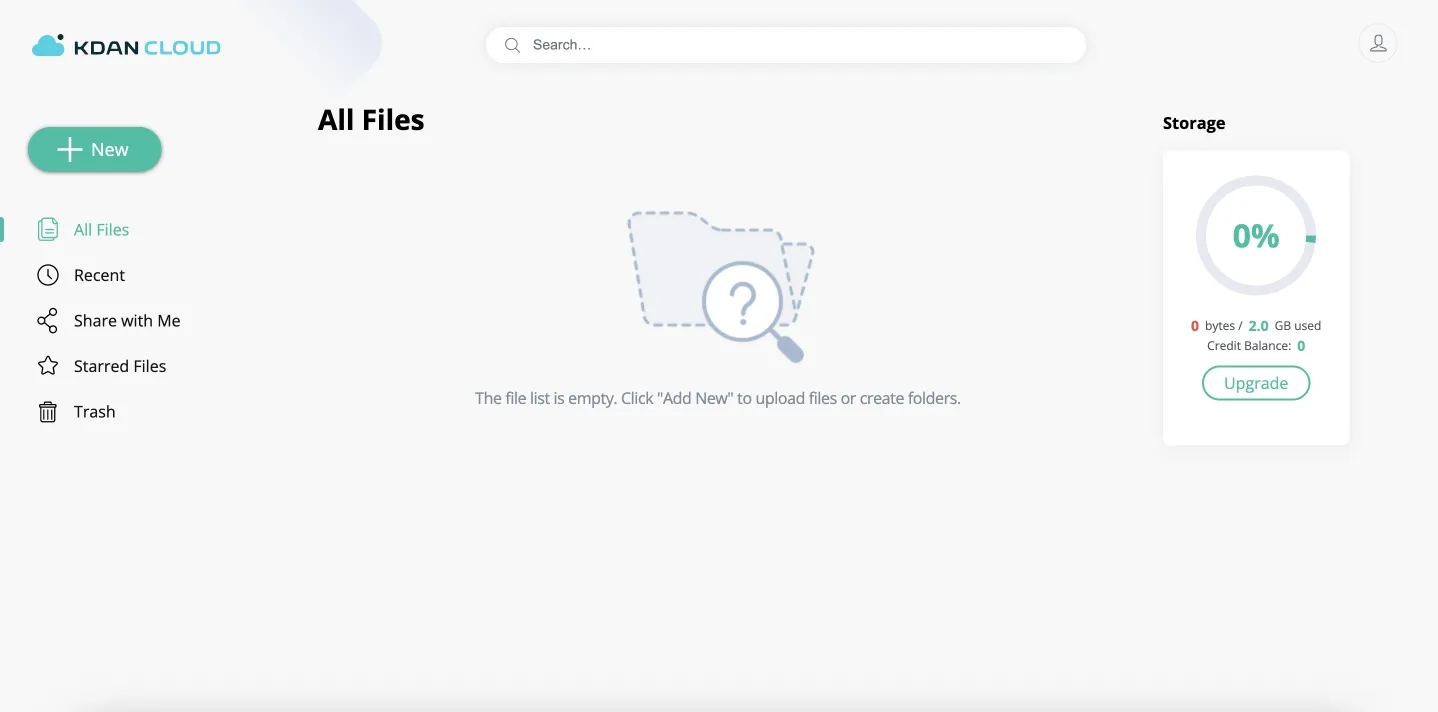
Why it stands out
Kdan Cloud works best if you already use Kdan’s products. You can save files directly from Kdan apps and access them quickly from desktop, mobile, or web. Integration across the creative suite can make the step from edit to share feel more streamlined.
What's missing
Users report that uploading other file types and searching large libraries can be less convenient or less accurate. The maximum 1 TB plan may also be limiting for studios handling large media libraries.
Who it's for
Kdan Cloud is a fit for freelancers, educators, and creatives who already work with Kdan tools and want storage designed around that workflow.
Pricing
| Plan | Storage | Monthly | Annual |
|---|---|---|---|
| Free | 2 GB | – | – |
| Premium | 500 GB | $2.99 | $9.99 |
| Creativity 365 | 1 TB | $9.99 | $59.99 |
Hands-on notes
Small and mid-sized uploads are fine, and previews load quickly for most formats. If you’ve used Kdan tools before, the interface will feel familiar. Recovery is possible, but it’s not as straightforward as on more advanced cloud services.
SpiderOak
SpiderOak is a secure cloud storage provider often used by cybersecurity specialists, journalists, and organizations handling confidential data. It uses a three-layer, zero-knowledge encryption approach.

Why it stands out
SpiderOak lets you share files via password-protected links and restore data to a specific point in time, which helps protect against accidental loss or ransomware. It also keeps an unlimited version history. It supports Windows, macOS, and Linux.
What's missing
The interface feels outdated compared to Google Drive. There’s no built-in document editor, no real-time collaboration, and syncing large folders can be slow.
Who it's for
SpiderOak is designed for people who need enhanced privacy — cybersecurity professionals, journalists, researchers, or teams managing sensitive information.
Pricing
| Storage | Monthly | Annually |
|---|---|---|
| 150 GB | $6 | $69 |
| 400 GB | $11 | $115 |
| 2 TB | $14 | $149 |
| 5 TB | $29 | $320 |
Hands-on notes
Backups are reliable and recovery works well. Upload speeds are reasonable, but the first sync can take time if you’re moving a large library. Once set up, it runs quietly in the background.
Backblaze
Backblaze is primarily a backup service and can be an alternative to traditional cloud storage.
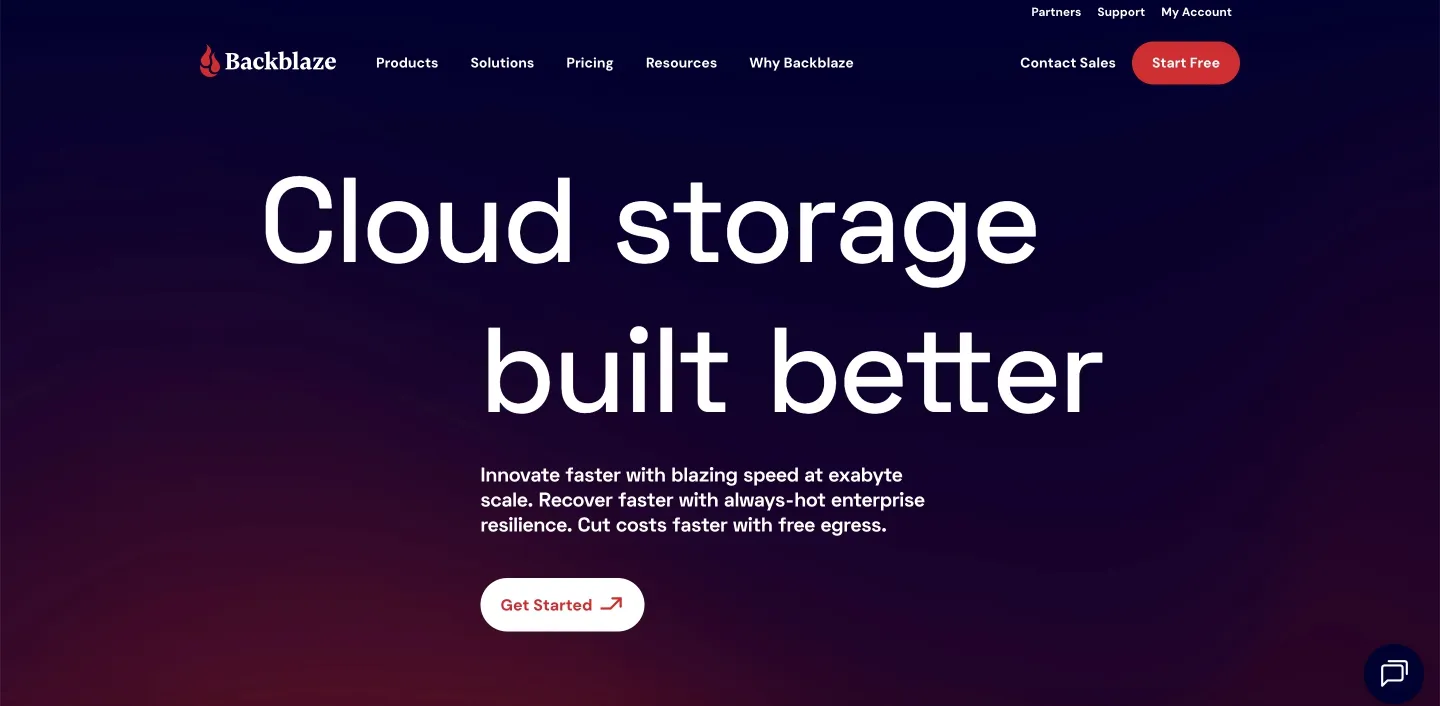
Why it stands out
Backblaze is known for being simple and offering unlimited backups. Instead of charging based on storage like Google Drive, it uses a flat fee and automatically backs up files.
What's missing
It’s great for protection and recovery, but it doesn’t offer collaboration tools like Google Drive or OneDrive.
Who it's for
Backblaze is a good option for individuals or small groups who want reliable backups without worrying about file size limits, especially creators and freelancers with large libraries.
Pricing
| Plan | Price |
|---|---|
| B2 Cloud Storage | $6 per TB/month storage plus egress fees* |
*Egress fees — charges for downloading or transferring data out of the cloud storage to your local devices or other services.
Hands-on Notes
Files back up automatically when they change. The first full backup can take a while, but incremental backups after that are typically faster.
Egnyte Enterprise
Egnyte Enterprise combines cloud storage with on-premises storage, designed for organizations that need control, compliance, and stable team access.
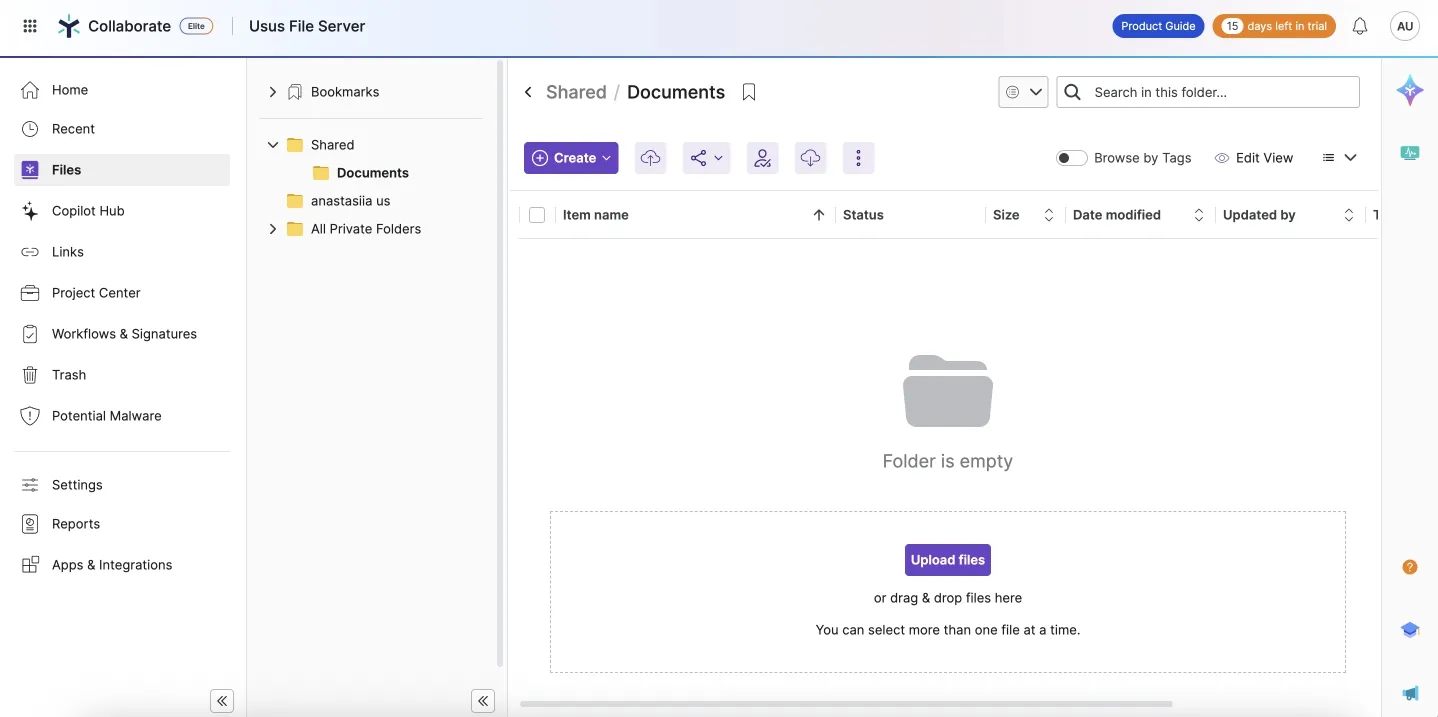
Why it stands out
Egnyte Enterprise gives organizations control over where files live: in the cloud, on internal servers, or both. It supports detailed permission settings and enterprise-grade security for regulated content, without stopping collaboration.
What's missing
There are limits on the number of files per folder and API usage. Some advanced features (like Enterprise Key Management) are restricted to higher-tier plans. It’s powerful, but complex and costly for smaller teams.
Who it's for
Egnyte Enterprise fits mid-sized to large organizations that need strict access controls and compliance features.
Pricing
| Plan | Storage | Monthly | Annually |
|---|---|---|---|
| Business | 100GB | $22 | $264 |
| Enterprise Lite | 150GB | $38 | $456 |
| Elite | 150GB | $46 | $552 |
| Ultimate | 150GB | — | — |
Hands-on notes
Some G2 users report that setup takes time and that ongoing management may require IT involvement.
iDrive Team
iDrive is a cloud storage solution designed for businesses that need secure file backup and easy collaboration. Compared with Google Drive, it offers continuous data protection and centralized management of teammates.
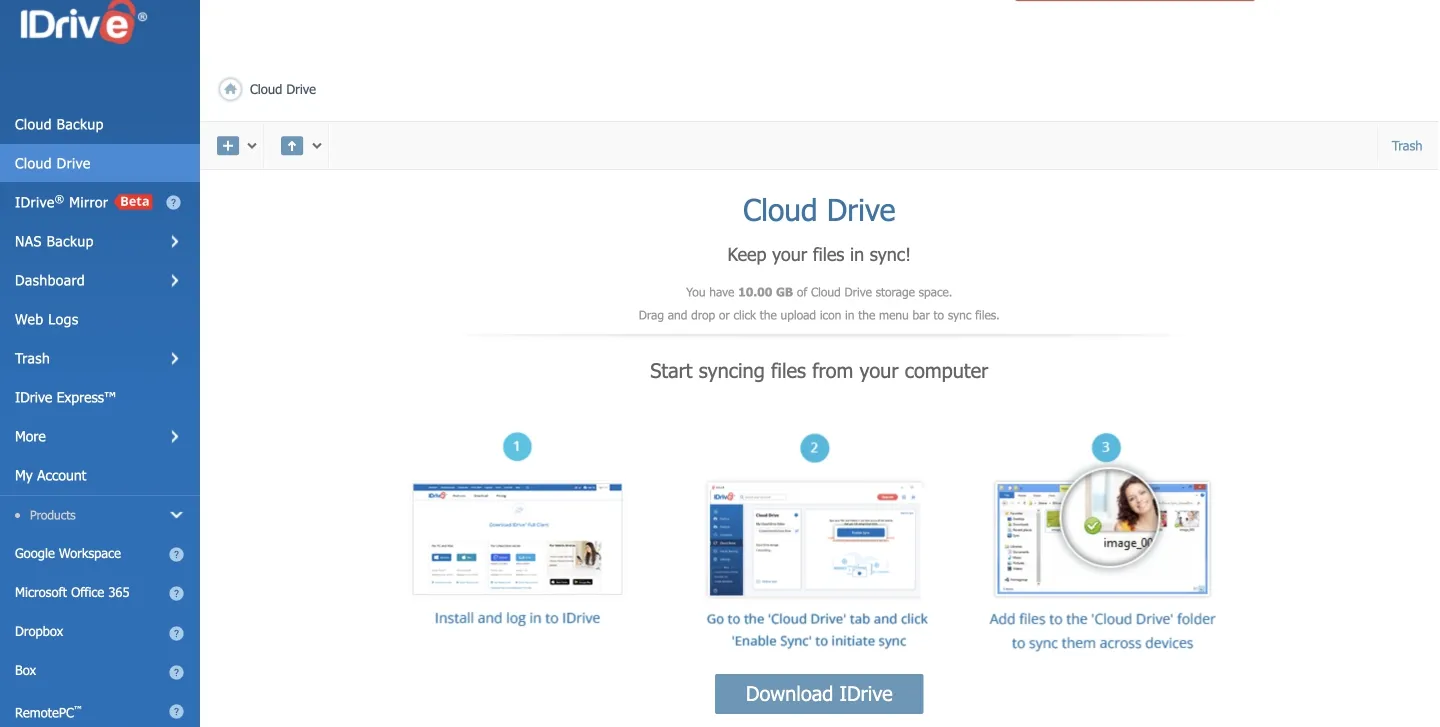
Why it stands out
iDrive Team can back up desktops and mobile devices, and also Google Workspace (server-side) and other cloud apps. It syncs in real time, so team members can access the latest versions from any device.
What's missing
The iDrive Team lacks advanced collaboration tools, such as real-time document editing and team communication features.
Who It's For
iDrive Team is ideal for companies that need to back up their data and share files securely without requiring collaboration tools.
Pricing
| Plan | Storage | Monthly | Annually |
|---|---|---|---|
| Basic | 10GB | — | — |
| IDrive Mini | 100GB | — | $2.95 |
| IDrive Team | 5TB | $9.95 | $99.50 |
| IDrive Business | 250GB | $49.95 | $99.50 |
Hands-on notes
People like iDrive Team because it's easy to set up and it just works, though some users may need other platforms to edit documents and communicate in real time.
Citrix Content Collaboration
Citrix Content Collaboration is a secure cloud storage and collaboration platform built for organizations that need stronger permissions and workflow tools.
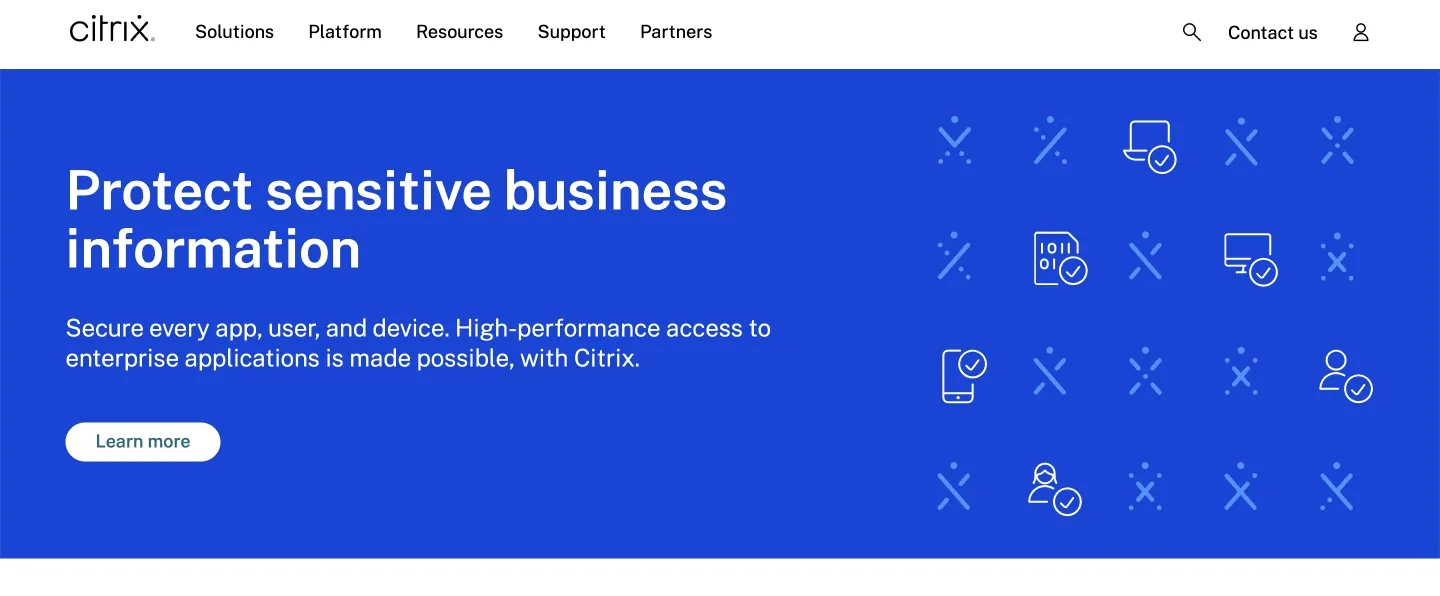
Why it stands out
Citrix makes it possible to control who can view or edit each file with clear access roles. It also supports workflow automation, including approvals and e-signatures, which helps keep document-heavy processes moving while maintaining security.
What's missing
Because the platform is feature-heavy, new users may face a learning curve. It can also require IT skills to configure and manage properly, especially if you use deeper customization.
Who it's for
Citrix Content Collaboration is aimed at large enterprises that need strong security, workflow automation, and compliance-ready sharing — often in healthcare, finance, manufacturing, education, government, and retail.
Tresorit
Tresorit is a cloud storage platform focused on privacy, with end-to-end encryption.
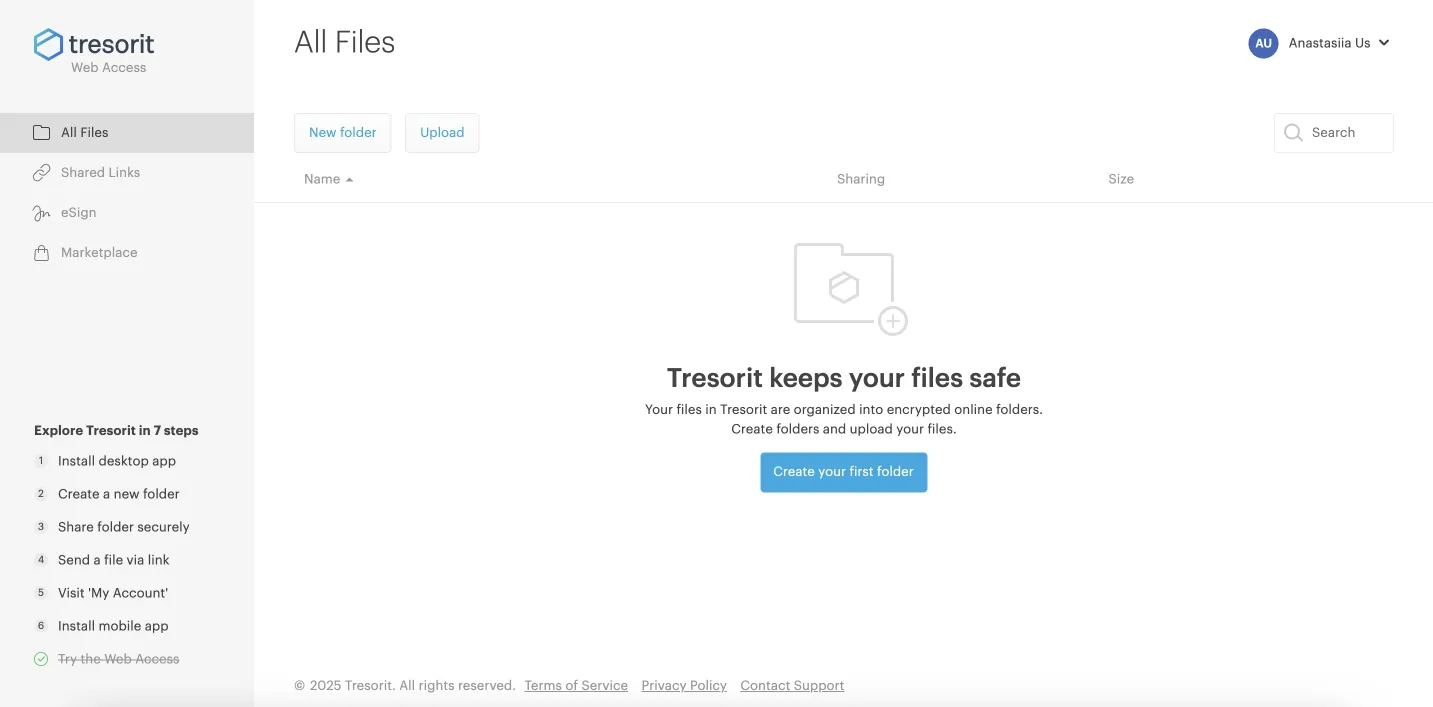
Why it stands out
Tresorit’s biggest strength is security. You hold the keys, so it’s protected with a true zero-knowledge approach. At the same time, it still supports collaboration through shared folders, secure links, and version history.
What's missing
It can be more expensive than other zero-knowledge services, and some users find the interface less intuitive than more mainstream platforms. Real-time collaboration (like document editing) is limited.
Who it's for
Tresorit is a strong fit for professionals and organizations that prioritize privacy and handle sensitive information.
Pricing
| Plan | Storage | Monthly | Annually |
|---|---|---|---|
| Personal Lite | 50GB | €4.99 | €47.88 |
| Personal Essential | 1TB | €11.99 | €119.88 |
| Personal Pro | 4TB | €29.99 | €287.88 |
| Business | 6 TB | €20/user month | €192/user |
| Enterprise | Custom | Custom | Custom |
Hands-on notes
Uploading and syncing data is easy; however, large files may take longer than with other services due to encryption. Some users may struggle to locate advanced options and user permissions at first.
ShareFile
ShareFile is—not-surprisingly—all about sharing files, and security is a big part of that. Unlike the vast majority of consumer cloud storage services, ShareFile is explicitly designed for enterprises.

Why it stands out
ShareFile is built for businesses that need tighter security and control than Google Drive typically provides. It supports cloud or on-premises storage, detailed permissions, and integrations with tools like Outlook and Microsoft Office. Admins can revoke access quickly if a device goes missing.
What's missing
ShareFile is excellent for security and compliance, but it may not be as user-friendly as some other platforms, which means additional clicks to complete ordinary tasks and some time to learn how to use it.
Who it's for
ShareFile is ideal for businesses operating in regulated industries such as finance, healthcare, and legal services, where data protection and compliance are the cornerstones.
Pricing
| Plan | Storage | Monthly | Annually |
|---|---|---|---|
| Advanced | 3TB | $17.60 | $192/ user |
| Premium | 3TB | $27.50 | $300/ user |
| Industry Advantage | 3TB | $45.83 | $500/ user |
| Virtual Data Room | 3TB | $75 | $810 / user |
Hands-on notes
The interface can feel complex, and the starting price is high for smaller businesses.
Zoho WorkDrive
Zoho WorkDrive is cloud storage designed for teams and businesses. It focuses on team workspaces and role-based access to keep projects organized.
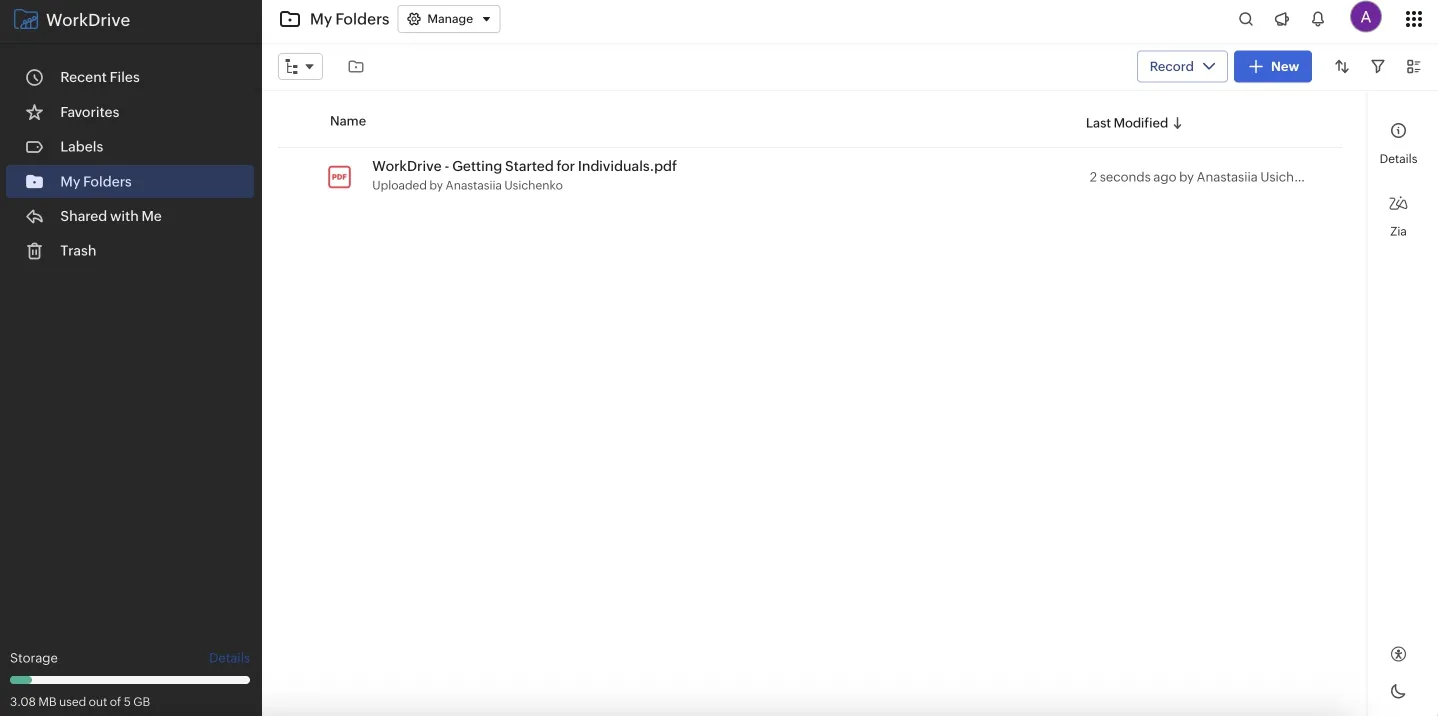
Why it stands out
WorkDrive is built around shared team folders and permission levels. You can assign access rights, track file activity, and keep work organized by team structure. Many business plans also integrate with Zoho Flow or Zapier for approvals and automation.
What's missing
It doesn’t offer zero-knowledge encryption, so it provides less security than privacy-first services. Offline access and advanced syncing options also aren’t as strong as on some alternatives.
Who it's for
Zoho WorkDrive is a good option for small to mid-sized businesses that want structured, affordable storage — especially teams already using Zoho products like CRM.
Pricing
| Plan | Storage | Monthly | Annual |
|---|---|---|---|
| Starter | 1 TB/team | €3/user month | €30/user |
| Team | 3 TB/team | €6/user month | €54/user |
| Business | 5 TB/team | €11/user month | €108/user |
Hands-on notes
WorkDrive integrates well with other Zoho tools and is generally easy to use. Some users say advanced sync options aren’t very flexible, but it works smoothly for everyday team workflows.
Final thoughts
Google Drive remains a popular choice because it’s easy, familiar, and integrates well with other Google tools. But it also has real limitations, especially around privacy, scaling, organization, and workflow control. Alternatives like Pics.io, Dropbox, OneDrive, Box, and pCloud can offer stronger security, more specialized features, or pricing that makes more sense for certain teams.
When you’re choosing a cloud storage solution, it helps to focus on what actually affects your day-to-day work: how much space you need, how you organize files, and how your team shares and collaborates.
Methodology & sources
Here are the key steps used when researching and comparing Google Drive alternatives:
- Reviewing official documentation, feature lists, and pricing pages.
- Reading user reviews on platforms like G2, Capterra, and Trustpilot to understand real-world pros and cons.
- Looking at current tech articles, comparison charts, and reports from reputable tech blogs and business magazines.
- Testing key features where possible (file sharing, media organization, collaboration tools, security settings).
- Tracking release notes and new features to keep comparisons aligned with current capabilities.
FAQ
What is the best alternative to Google Drive in 2025?
It depends on what you’re trying to solve. Pics.io is a strong option for creative teams, Microsoft OneDrive fits Microsoft-heavy organizations, and Dropbox is often chosen for fast, reliable syncing. For maximum privacy and security, NordLocker or Sync.com are common picks because of end-to-end encryption. If cost is the main factor, iDrive can be a cost-effective option.
Why would I look for a Google Drive replacement?
Usually it happens when search becomes painful in large libraries, privacy concerns come up, Drive limits start blocking growth, or pricing becomes hard to justify as storage needs increase.
Did you enjoy this article? Give Pics.io a try — or book a demo with us, and we'll be happy to answer any of your questions.
Author
Vladimir MikheevVolodymyr is a B2B sales and DAM consultant for English-speaking markets, optimizing processes, leading high-impact demos, and implementing practical IT solutions. Since 2019 he’s helped 400+ companies adopt DAM (900+ demos) and align sales, marketing, and product in HubSpot CRM.




